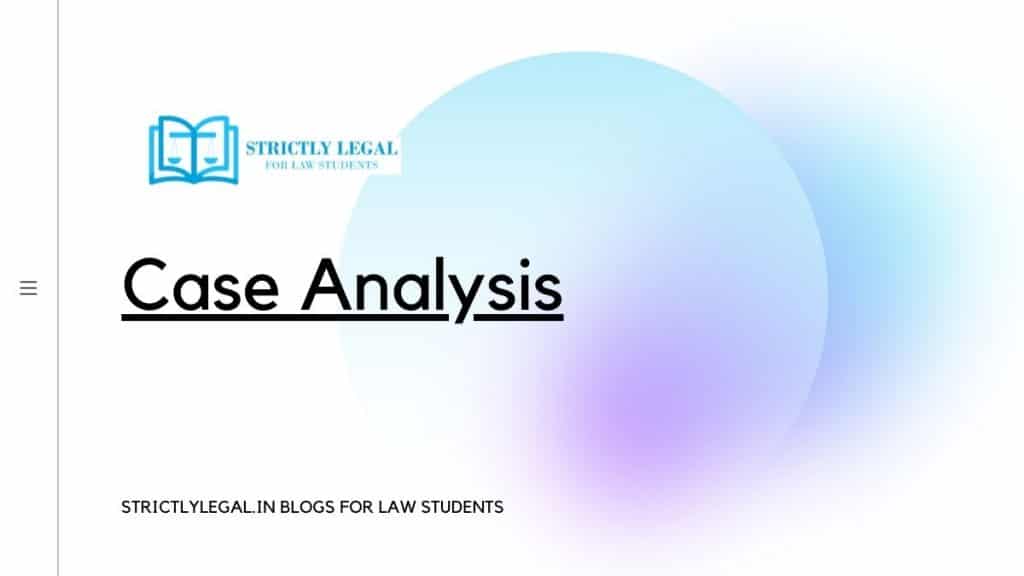State of Orissa v. Ram Bahadur Thapa AIR 1960 Ori 161, 1960 CriLJ 1349 is a historic case where the people used to believe in the existence of the supernatural powers. Under this case, the incident was happened where accused took the defense on the basis of existence of supernatural things like ghosts. The court here tried whether the defense was valid or not.
This article was submitted by Amisha Gupta of BBA LLB HONS CORPORATE LAWS, 4th year, University of Petroleum and Energy studies, Dehradun
Table of Contents
FACTS OF THE CASE
The case revolves around the incident where respondent is accused of the murder of one woman and grievous hurt to other women.
Jagat bandhu chatterjee from the firm chatterjee brothers, Calcutta visited rasgovindpur and on this business trip his Nepali servant named ram bahadur thapa accompanied him. They visited in the month of April in 1958 for the purpose of purchasing aerospace
They stayed near some village area where adivasis used to live. As it was long tie ago, those people believed in ghost and supernatural thing, there were rumors that the aerodrome i.e the place where they were staying in surrounded with ghost. Moreover they told them Tuesday and Saturdays are the most horrific days of the week.
After this information, jagat bandhu (employer) and his servant i.e. ram bahadur thapa got excited as this was new for them and they wanted to see ghost. For this, they got out on 20.05.1958, Tuesday with their landlord Krishna Chandra patro who was from rasgovindpur, also accompanied them at midnight in search of ghost.
As they were moving, at distant they saw some flickering of lights coming out of dark. They believed that it was the signal from ghost as there were some moment ad wind was very fast which gave them the impression of will o wisp. The circumstances made them believe that there is some ghost around them.
Ram bahadur thapa who is respondent in this case, attacked the woman in haste believing her as ghost. He was carrying ‘khurki’ with him and he attacked her by that which resulted in the instant death of that woman.
During this incident, he attacked other women and hurt them who were with that dead woman. Also the landlord was also hurt under this incident. Subsequently he noticed that those were females’ majhis of the beauty who he believed to the ghost and they were collecting mahua flowers. Because of this incident, ram bahadur i.e. respondent was charged under section 302, 324 and 3260 of Indian penal code for murder and grievous hurt to other people.
When this case first referred to session court, the judge ordered for the acquittal of the respondent. Later the appeal was filed by the victims against the order but high court believes the findings of the session court as correct and it upheld the order of acquittal.
ISSUE:
In State of Orissa v. Ram Bahadur Thapa, the Court of Session acquitted the accused who was charged under section 302, 326 and 324 of Indian penal code 1860. The issue which was questioned in appeal was whether the decision of the subordinate court was valid when it accepted the defense of super natural power which means defending the offence under general exception under section 79 of IPC 1860. Hence does the decision of acquittal made by the subordinate was valid or not?
JUDGMENT OF THE COURT:
The court found the act covered under general exceptions of the criminal act stated under chapter IV of Indian penal code 1860. It was believed by the session judge that the circumstances and the situation of the event was as such which is completely under shield of the mistake of fact[1]. Section 79 of Indian penal code 1860 is a rescues provision which states that if the act is done under bona fide mistake of fact then there will be no punishment on that part. Here the mistake must be bona fide which means that must be in good faith[2].
The benefit of section 79 IPC is only given to person who acts in the mistake of fact in a good faith. The court here is satisfied regarding the situation under which Nepali servant Mr. Ram Bahadur Thapa i.e. the respondent acted, can’t be termed as carelessness or mala fide but as per the evidence and consideration of status it is clear that the act caused was under good faith.
ANALYSIS:
Section 79 IPC stated about the mistake of fact as a general exception where the crime is committed. It states that when the person believes or assumed anything else which is mistaken of fact and by that fact he actually believes his act to be valid under law such as self defense than the act will be termed as committed under good faith[3]. No mistake on the part of law is accepted here and only the mistaken part on the facts of the situation can be considered under section 79 of IPC. This is the defense which the accused can be supported by when he believes that he actually acted in the mistake of fact.
Under the case, the Nepali servant i.e. respondent believes on the existence of the ghosts as the era was very old where the existence of ghost are widely accepted by the people. In that era everyone believes on the existence of ghost where judiciary being a normal people also believes in these supernatural things. Respondent was clear about the presence of ghost hence he was mistaken human beings as ghosts and thus attacked on them. This made him mistaken of fact as he recognized human beings as the ghosts.
This was the complete consequence of the indiscriminate attack where the counsel of respondent argues that his client genuinely believed on the existence of the ghosts which is the reason of the attack. This statement is highly supported by the time period of the case which is late 1950s time period.
The question was raised by the opposite party counsel i.e. prosecutor, where they asked about the duty of care and attention. This argument was rebutted by the justice R Narasimham itself in the appellate court where he contented on the section 52 of IPC which defines the good faith. Further the duty of care and the definition of the good faith differ from case to case and situation to situation. There is no uniform way to explain the term ‘good faith’.
In emperor case[4], the court answered the very debatable issue by stating that the accurate test for ‘due care’ would be to check for the ‘capacity and intelligence’ of the accused. Hence if any case aroused than the intelligence or the presence of mind of the accused will be checked before granting him the benefit of the section 79 IPC. Under the case, the respondent acted without applying any mind which means the attack was the instant reaction without having any second thought. The people around him were shouting that there is a ghost’, which provoked him and made him to believe more on the existence of ghost around hi the attack was the reaction out of the self defense. The individual was untrained person with inexperienced mind.
There are many factors which supports his mental condition. Firstly the respondent was very new to that place and completely unaware about the custom and the living style of that area which made him to believe and act according to the direction of the localite people. The localite filled his mind with all the ghost’s thoughts which made his mind filled up with emotions of fear at the same time. Moreover, those people firmly believed in the supernatural power that they reported that Tuesday and Saturday are the two most horrific day of the week and surprisingly the day on which the accident happened was one of these two days. The respondent was very sure about the presence of ghost due to this so called customary mark of that village.
Secondly there were many circumstantial evidence which crystallized o the presence of some supernatural activity like there was flickering of lights, heavy blowing of winds and the presence of woman at night who was indulging in plucking flowers as it is hard to believe that woman came out for flowers on such supernatural night.
There was no action recorded on the part of Mr. chatterjee i.e his employer for stopping him or discouraging him while he was making attack in self defense. There were neither efforts nor prevention on the part of other two people who accompanied the respondent by which it can be assumed that those people were also terrified by that situation and they believed the action of respondent justified.
The point of checking on the person who cried out of the pain is illogical as no human being go for verification when it is believed that it’s a supernatural night and the circumstantial evidence indicated towards it.
Law cannot expect from person to act in a required manner when he is in fear and completely pervaded with the emotions.
By these factors and the observations it is believed and supported the judgment given by the session court. But this judgment won’t be much relevant in current scenario as the present situation is much different from 1959 time period. Currently there will be hardly any defense on the ground of supernatural powers as judiciary doesn’t believe on the presence of such activity.
CONCLUSION:
There are various other legislations and provision which was relied by this judgment. Section 52 and 79 of IPC was referred while judging this case. Other than this various precedents such as Emperor v. Abdool Wadood Ahmed[5], Waryam Singh v. Emperor[6], Bhawoo Jiwaji v. Mulji Dayal[7] were considered while giving effect to general exception under IPC.
People nowadays should be more cautious and shouldn’t believe much in these superstition things. In current scenarios people are deceiving people by becoming ‘sandhus’, ‘fakiras’ etc. and they took undue influence at the name of god.
[1] Section 76 and 79 IPC
[2] Section 52 of Indian penal code 1860
[3] Section 52 IPC.
[4] Emperor v. Abdeol Wadood Ahmed (ILR 31 Bom 293)
[5] ILR 31 Bom 293
[6] AIR 1926 Lah 554
[7] ILR 12 Bom 377

Users not registered with Strictlylegal can Email us their content and the same are posted through this account. In case of abuse, kindly let us know at [email protected]





